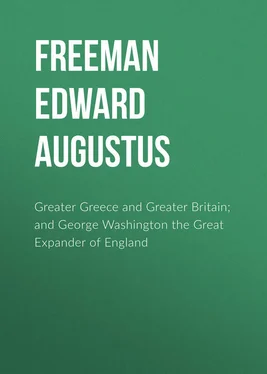Edward Freeman - Greater Greece and Greater Britain; and George Washington the Great Expander of England
Здесь есть возможность читать онлайн «Edward Freeman - Greater Greece and Greater Britain; and George Washington the Great Expander of England» — ознакомительный отрывок электронной книги совершенно бесплатно, а после прочтения отрывка купить полную версию. В некоторых случаях можно слушать аудио, скачать через торрент в формате fb2 и присутствует краткое содержание. Жанр: foreign_antique, foreign_prose, на английском языке. Описание произведения, (предисловие) а так же отзывы посетителей доступны на портале библиотеки ЛибКат.
- Название:Greater Greece and Greater Britain; and George Washington the Great Expander of England
- Автор:
- Жанр:
- Год:неизвестен
- ISBN:нет данных
- Рейтинг книги:4 / 5. Голосов: 1
-
Избранное:Добавить в избранное
- Отзывы:
-
Ваша оценка:
- 80
- 1
- 2
- 3
- 4
- 5
Greater Greece and Greater Britain; and George Washington the Great Expander of England: краткое содержание, описание и аннотация
Предлагаем к чтению аннотацию, описание, краткое содержание или предисловие (зависит от того, что написал сам автор книги «Greater Greece and Greater Britain; and George Washington the Great Expander of England»). Если вы не нашли необходимую информацию о книге — напишите в комментариях, мы постараемся отыскать её.
Greater Greece and Greater Britain; and George Washington the Great Expander of England — читать онлайн ознакомительный отрывок
Ниже представлен текст книги, разбитый по страницам. Система сохранения места последней прочитанной страницы, позволяет с удобством читать онлайн бесплатно книгу «Greater Greece and Greater Britain; and George Washington the Great Expander of England», без необходимости каждый раз заново искать на чём Вы остановились. Поставьте закладку, и сможете в любой момент перейти на страницу, на которой закончили чтение.
Интервал:
Закладка:
Now there is no branch of political life on which these distinctions tell with greater force than on the work of planting new homes of any people beyond the sea. The colonies, the settlements, the plantations, of that elder world whose range of settlement was the Mediterranean were settlements of citizens who set forth from cities. The colonies, the settlements, the plantations of the newer world whose range of settlement has been the Ocean have been mainly settlements of subjects who set forth from kingdoms. Hence, while in almost every other point the two systems of settlement are so wonderfully alike, in all those points which immediately follow from this essential deference they stand utterly aloof from each other. The men who planted Greater Greece – whether we mean thereby the land once really so called or any other part of the Greek colonial world – were citizens of cities. The men who planted Greater Britain, if so we are to call it, like the men who planted Greater Portugal, Greater Spain, or Greater France, were subjects of kingdoms. There is but one exception. The colonies of the United Netherlands were colonies planted by a commonwealth, and of all European colonies they have departed most widely from the old Greek model. But though colonies of a commonwealth, though colonies of a commonwealth in which cities played the chief part, they could hardly be called colonies of cities. They were colonies of a great confederation, of an aristocratic confederation, which had in many things more in common with kingdoms than with independent cities. They were colonies planted in a colonial world in which the colonies of kingdoms had set the model. The kingdom then, and not the commonwealth, has been the essential colonizing element in modern Europe. The colonies of modern Europe have been in the main colonies of subjects, not of citizens. Each alike, citizen and subject, carried with him that form of political life which was natural to each. The Greek colonist, citizen of a city, planted a city. Severed from his native city, severed perhaps by such a world of waters as that which parts Euboia from Sicily or by such a wider world of waters as parts Phôkaia from Gaul, he could no longer remain a citizen of his own city; he could no longer discharge the duties of citizenship on a distant spot; he could no longer join in the debates of the old agorê ; he could no longer join in the worship of the old temple; but he must still have some agorê and some temple; he must still have a city to dwell in, a city in which still to dwell the life of a free Greek, when he could no longer live that life in the city of his birth. So he planted a city, a free city, a city that knew no lord, that knew no ruling city, a city furnished from the first with all that was needed for the life of a Greek commonwealth, a city free and independent from its birth. And he dwelled in the new city as he had once dwelled in the old; he gave himself to make the new worthy of the old, the daughter worthy of the mother. But did he thereby deem that he had ceased to be a Greek? Did he deem that he had severed himself from Greece? Did he even deem that he had broken off from all duty and fellowship towards the city from whence he had set forth? No; dwell where he might, the Greek remained a Greek; wherever he went he carried Hellas with him; in Asia, in Libya, in Sicily, in Italy, in Gaul, far away by the pillars that guarded the mouth of Ocean, far away in the inmost recesses of the Inhospitable Sea, wherever he trod, a new Hellas, if we will, a Greater Hellas, sprang into being; on those new shores of Hellas he kept his old Hellenic heart, his old Hellenic fellowship; he still kept the tongue and customs of his folk; he clave to the gods of his folk; he could go to the old land and consult their oracles, he could claim his place in their sacred games, as freely as if he still dwelled by the banks of the Spartan Eurôtas or under the shadow of the holy rock of Athens. And how fared he towards the city of his birth, the metropolis , the mother-city of his new home, the birthplace and cradle of himself and his fellow-citizens of his new city? Political tie none remained; no such tie could remain among a system of cities. Parent and child were on the political side necessarily parted; the colonist could exercise no political rights in the mother-city, nor did the mother-city put forward any claim to be lady and mistress of her distant daughter. Still the love, the reverence, due to a parent was never lacking. The tie of memory, the tie of kindred, the tie of religion, were of themselves so strong that no tie of political allegiance was needed to make them stronger. The sacred fire on the hearth of the new city was kindled from the hearth of its mother; the parent was honoured with fitting honours, her gods were honoured with fitting offerings; her citizens were welcomed as elder brethren when they visited the younger city. And when the child itself became a parent, when the new city itself sent forth its colonies, the mother-city of all was prayed to share in the work and to send forth elder brethren of her own stock to be leaders in the enterprise of her children.
In truth the ordinary story of the relations between a Greek colony and its metropolis, relations that is between a perfectly independent state and another state to which it looks up with traditional reverence, is perhaps the most attractive feature of Greek political life. The history of the relations between Corinth and Syracuse is a pleasing tale throughout. During all the centuries of the joint independence of the two cities, the relations between the metropolis and its great colony are ever fresh, ever friendly. The Syracusan is not a Corinthian; the sea that rolls between Ortygia and the Isthmus forbids that. But he never forgets that he is a child of Corinth, a child of Peloponnêsos; he cleaves with pride to the local speech of his fathers; he cherishes the worship of the gods and heroes of the city of his fathers, their names and their legends live on his lips; Syracuse may grow into a greater and mightier city than her parent; but that Corinth is the parent is a thought that never dies out from any Syracusan heart. Yet the child is free and independent, free and independent from its beginning. Corinth makes not the slightest claim to authority or superiority over Syracuse; but she is ever ready to step in when any need on the part of Syracuse calls for her help; she steps in as bound to something which to her is dearer and more recked of than the most cherished among allies who are not her children. The mother-city steps in alike when Syracuse is pressed by foreign enemies and when she is torn by domestic seditions. She acts as a mediator between Syracuse and her foes; she shelters alike her banished patriots, her banished tyrant, even the foreign enemy whom Syracuse has spared and has given to her mother’s keeping. And, a gift precious above all, she sends her own deliverer to be in turn the deliverer of his brethren. And this friendship between Corinth and Syracuse is no friendship that stands alone; it is the common tie which binds Greek metropolis and Greek colony to one another. And all this becomes the more striking when we come to compare the tale of Corinth and Syracuse with some really exceptional cases in which the relations of metropolis and colony were less amiable. Strange to say, we can find them in the history of this very Corinth and this very Syracuse. No War of Independence, no Declaration of Independence, was ever needed between Corinth and Syracuse, because Syracuse was from the beginning independent of her metropolis, and therefore friendly to her metropolis. But perhaps a declaration of independence, certainly a war of independence, was needed between Corinth and Korkyra, between Syracuse and Kamarina. In each of those cases the metropolis did claim some measure of authority over the colony. The fruit of this departure from the common system of Greek settlement was that abiding ill-will between Korkyra and her parent Corinth which stands out among the best known facts of Grecian history. And yet perhaps in the only case where we see Corinth and Korkyra acting together in friendly guise, it shows that something of the better, the more usual, feeling was not wholly banished from Corinthian and Korkyraian hearts; we once see the two cities join to do the duty of a parent and a sister as mediators on behalf of Syracuse against an enemy. As for the other less famous case, we read that Kamarina, a colony of Syracuse, revolted against her metropolis and was swept from the earth as a punishment. The doom was heavy; the fault may have been grave; but between Corinth and Syracuse, between Phôkaia and Massalia, there was no room for revolt or for its penalties.
Читать дальшеИнтервал:
Закладка:
Похожие книги на «Greater Greece and Greater Britain; and George Washington the Great Expander of England»
Представляем Вашему вниманию похожие книги на «Greater Greece and Greater Britain; and George Washington the Great Expander of England» списком для выбора. Мы отобрали схожую по названию и смыслу литературу в надежде предоставить читателям больше вариантов отыскать новые, интересные, ещё непрочитанные произведения.
Обсуждение, отзывы о книге «Greater Greece and Greater Britain; and George Washington the Great Expander of England» и просто собственные мнения читателей. Оставьте ваши комментарии, напишите, что Вы думаете о произведении, его смысле или главных героях. Укажите что конкретно понравилось, а что нет, и почему Вы так считаете.












